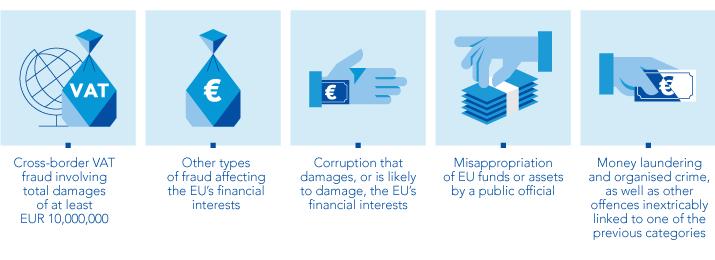The European Public Prosecutor’s Office (EPPO) is an independent public prosecution office of the European Union. It is responsible for investigating, prosecuting and bringing to judgment crimes against the financial interests of the EU. These include several types of fraud, VAT fraud with damages above 10 million euro, money laundering, corruption, etc.
The EPPO undertakes investigations, carries out acts of prosecution and exercises the functions of prosecutor in the competent courts of the participating Member States, until the case has been finally disposed of. Up until the EPPO starting its operations, only national authorities could investigate and prosecute these crimes, but their powers stopped at the borders of their country. Organisations like Eurojust, OLAF and Europol do not have the necessary powers to carry out such criminal investigations and prosecutions.
The mandate of the European Public Prosecutor’s Office is defined in Council Regulation (EU) 2017/1939, which entered into force on 20 November 2017. See the Legal Framework page to learn more about the laws governing various aspects of the EPPO.
What are the financial interests of the EU?
All revenues, expenditures and assets covered by, acquired through, or due to the European Union budget and the budgets of the institutions, bodies, offices and agencies established under the Treaties, and budgets managed and monitored by them.
Which crimes are involved?
Participating Member States need to have the ‘PIF Directive’ adopted into their national legislations. This directive of the Council and the Parliament covers the fight against fraud to the European Union’s financial interests by means of criminal law, and increases the level of protection of the EU budget by harmonising the definitions, sanctions and limitation periods of criminal offences affecting the EU’s financial interests.
It also defines which crimes are within the mandate of the EPPO:
- cross-border VAT fraud involving total damages of at least EUR 10,000,000;
- other types of fraud affecting the EU’s financial interests;
- corruption that damages, or is likely to damage, the EU’s financial interests;
- misappropriation of EU funds or assets by a public official;
- money laundering and organised crime, as well as other offences inextricably linked to one of the previous categories.
For example: If a civil servant takes a bribe in relation to an EU-funded project and conceals it by buying a house, the EPPO can investigate both the passive corruption and the subsequent money laundering.
Our partners
The European Public Prosecutor’s Office has established privileged partnerships with other EU institutions, bodies and agencies.
An agreement has been concluded with the European Commission, and working arrangements have been signed with OLAF, Eurojust, Europol, European Court of Auditors, European Investment Bank and the European Investment Fund.
In addition to cooperating with other EU institutions, bodies and agencies (such as the ones mentioned above), the EPPO also works with the following additional categories of partners:
- authorities of non-participating EU Member States;
- authorities of non-EU states (third countries);
- authorities of participating Member States;
- judicial cooperation and law enforcement networks (e.g. European Judicial Network, CARIN, etc.);
- international organisations and equivalent (Council of Europe, Interpol, etc.).
You can find the publicly available working arrangements with some of the above bodies in the Documents section of our website.

